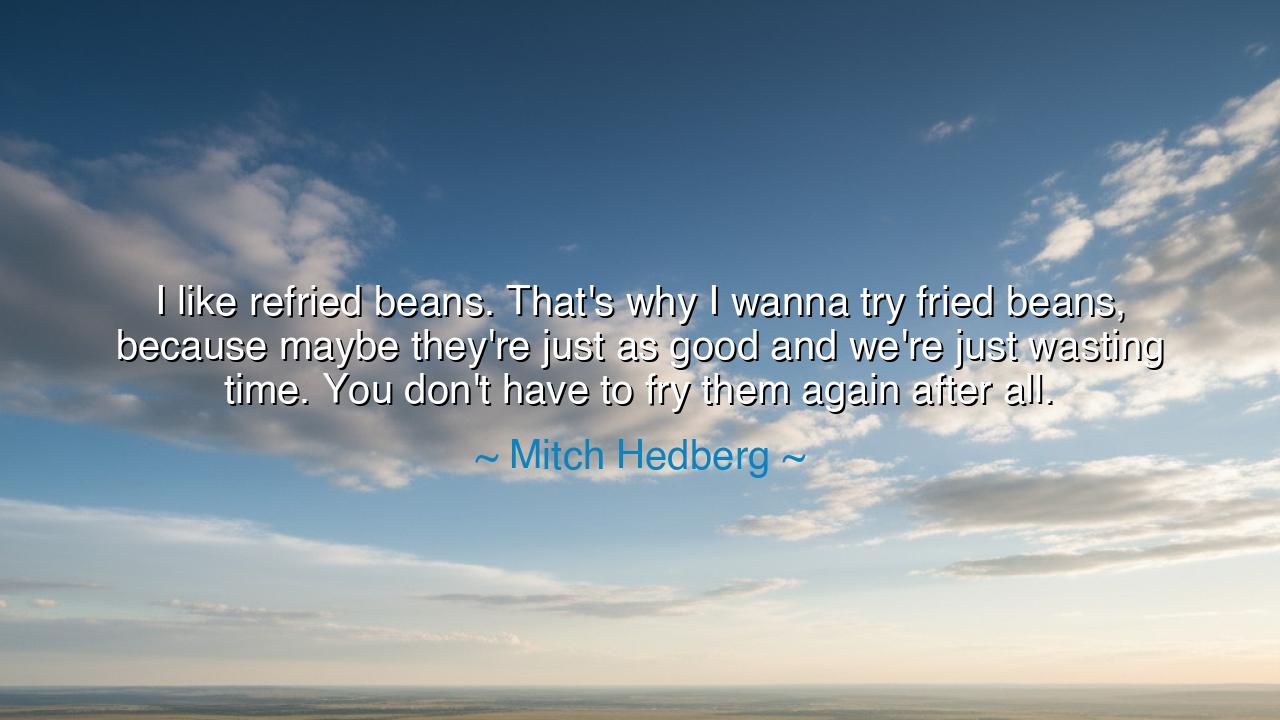
I like refried beans. That's why I wanna try fried beans
I like refried beans. That's why I wanna try fried beans, because maybe they're just as good and we're just wasting time. You don't have to fry them again after all.






In the words of the wandering sage of laughter, Mitch Hedberg, there is uttered this curious reflection: “I like refried beans. That’s why I wanna try fried beans, because maybe they’re just as good and we’re just wasting time. You don’t have to fry them again after all.” Though the tongue that spoke it was light, the truth it bears is heavy, and its jest conceals a hidden wisdom. For often it is in simple food, in common speech, in the play of wit, that the soul of philosophy hides itself.
The phrase begins with delight in the humble refried bean, a staple of the earth’s nourishment. Yet immediately the question rises—why are they refried? Why must the hand repeat a labor that perhaps was already complete? In this thought lies the challenge of generations: humanity repeats, polishes, reheats, remakes, often without asking whether the first act was already enough. The comedian’s words pierce into the heart of human habit, for we are creatures who rarely pause to ask why we do what we do.
Consider, children of the future, how empires have fallen under the weight of endless repetition. Think of the mighty builders of the Great Wall of China, who for centuries laid stone upon stone, reinforcing that which had already stood. While the Wall became a wonder of endurance, much of the labor was spent on refortifying rather than imagining new paths of strength. The lesson is not that such work was worthless—indeed, it held purpose—but that the human heart must always inquire: are we truly fortifying, or merely refrying?
In the same breath, Hedberg’s jest becomes a meditation on efficiency and innovation. Why do we not taste the simple fried bean before doubling our labor? The heart of invention has ever been the courage to question tradition. When Galileo looked to the heavens, he refused to accept the repeated dogma of the spheres. He tasted the “fried bean” of the cosmos and declared it sufficient to change the world. Thus, the question of the comedian becomes a parable for the daring spirit—one who dares to taste before repeating, to question before conforming.
Yet let us not despise the act of refrying. For there are times when repetition brings depth, just as beans cooked again become richer in flavor. So it is with the soul’s lessons: heard once, they nourish; heard twice, they transform. But the danger lies in blind ritual, in repeating for the sake of repeating. When the flame of awareness departs, the frying becomes an empty motion, and man wastes his days reheating that which was already warm.
The tale of Alexander the Great may also serve. In his campaigns, he was offered the knot of Gordius, a tangle that none had loosed. Many tried to “refry” the problem by the same old method—untying. Alexander, scorning repetition, cut boldly through the knot with his sword. He dared to try the “fried bean,” to act differently, and by this act he fulfilled the prophecy of kingship. His story teaches us that tradition without vision binds, but innovation with courage liberates.
Therefore, beloved listener, the teaching is clear: cherish what nourishes you, but do not be enslaved by custom. Ask yourself often: Am I refrying the same bean of habit, or am I tasting the first simplicity of life? Let your work be purposeful, not merely repeated. Let your questions be sharp, cutting through the knots of unnecessary tradition. Seek out the bean that is cooked but once, and savor the time you save for love, for learning, for joy.
The practical path is thus: when you labor, examine your steps. Cut away those that are empty repetitions. Seek the simpler road, the clearer solution, the first flame that suffices. In your daily life—whether in work, in relationships, or in thought—be mindful of the refried beans of habit, and dare to taste the fried beans of possibility. For in that daring, the soul grows lighter, the world grows wiser, and time, that most precious of treasures, is no longer wasted.






AAdministratorAdministrator
Welcome, honored guests. Please leave a comment, we will respond soon